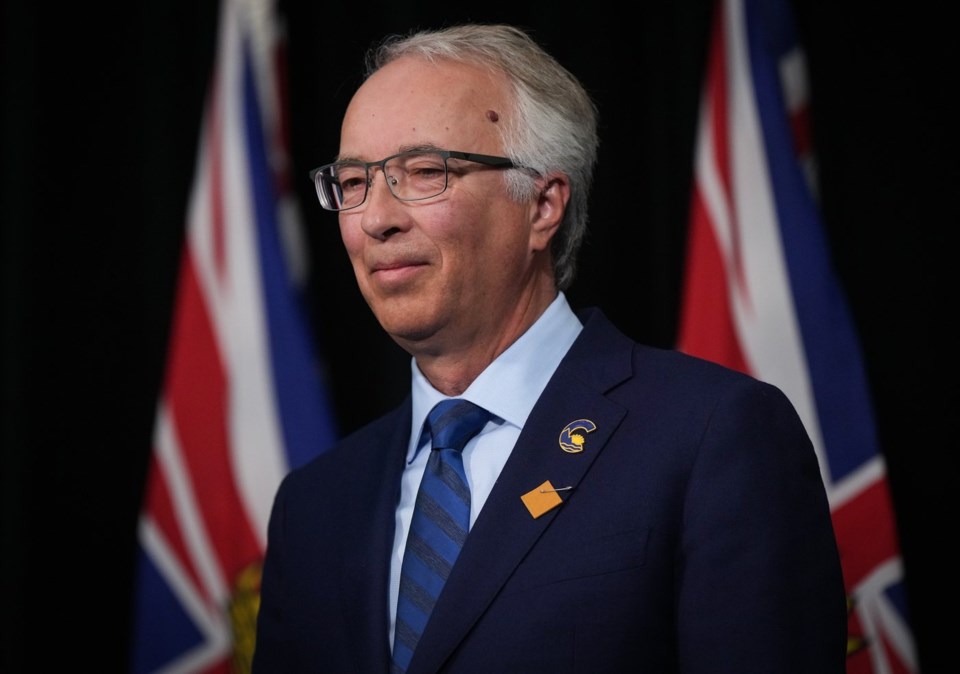VICTORIA — British Columbia's middle-of-the-road voters have been left with a stark choice in the province's fall election says a former B.C. Liberal cabinet minister — turn hard right or hard left.
Terry Lake, an environment and health minister in former premier Christy Clark's B.C. Liberal government, said he was conflicted but was leaning toward the NDP if the Conservatives didn't move toward the middle on environment and social issues.
His conundrum emerged after Opposition Leader Kevin Falcon suspended the campaign of BC United, formerly known as the B.C. Liberals, and threw his support behind the B.C. Conservatives led by John Rustad, to prevent centre-right vote splitting.
The decision was kept secret from Falcon's own party caucus and reshaped the political calculus for Lake and others.
"Yes, it's possible," said Lake, when asked Friday about voting NDP on Oct. 19.
"His (Rustad's) stance on climate change is a deal-breaker for me, and I think for many people. Unless they accept that the science is real, that it's impacting communities, like the north where John is from, they are not going to get enough support throughout the province."
Rustad has said that climate change is real but it is not a crisis, while his party says the impact of human activity is only one of hundreds of "potential factors." The United Nations' Intergovernmental Panel on Climate Change says it is "unequivocal" that humans are causing the warming of the planet.
Rustad, who was ejected by Falcon from the former B.C. Liberal caucus for his skeptical views on such climate science, said this week the Conservatives would not change their principles after the upheaval that saw Falcon announce the withdrawal of all BC United nominations on Wednesday.
Falcon and Rustad said their parties' candidates would be pooled under the BC Conservative banner and Conservative nominations reassessed.
Lake said Rustad's stance on climate change could be a factor that decides who forms government in the fall.
"There's definitely a lot of people out there, and I'm one of them, who are very centrist and not comfortable with the options we have now, that's for sure," said Lake, a former federal Liberal candidate in his Kamloops riding.
Lake cited veteran BC United member Todd Stone, who announced this week he would not seek re-election in his Kamloops riding, and expressed concern about the overall direction of the Conservatives while supporting the party's local candidate.
"If you want to become government, you have to, as Todd Stone so eloquently said, move from the extreme to mainstream," Lake said.
Others in BC United have expressed similar concerns since the folding of the party's campaign.
West Vancouver-Capilano MLA Karin Kirkpatrick, who said in February she would not seek re-election, said on social media platform X that Falcon's move did not consider that middle-of-the-road voters like her "would be forced to swing to the left."
Lake said politics was becoming more polarized, not just in B.C., but globally.
"We tend to be losing the middle ground in politics all over the world," he said. "That's worrisome."
The New Democrats have seized on the prospect of BC United supporters being disaffected by Falcon's decision.
Premier David Eby posted on social media on Thursday that his phone was "blowing up" with calls from former B.C. Liberal voters who could not bring themselves to support Rustad, saying the NDP welcomed such voters with concerns about climate change, reproductive freedom and building up the health care system.
But any potential shift of votes to the NDP as a result of BC United's implosion could be limited, said Shachi Kurl, president of the Angus Reid Institute.
She said polling data dating back months consistently indicated at least half of BC United voters were solidly in favour of shifting to the Conservatives, while the other half were split between switching to the NDP or not voting at all.
In recent weeks BC United support was running at about 10 per cent, Kurl said.
"We know that the Conservatives, who on their own, were in a voter-intent situation far stronger than BC United," she said. "The extent to which they needed those BC United votes is questionable."
Falcon's decision to scuttle his own party's campaign came amid a huge rise in support for the Conservatives over the past 18 months. The party obtained less than two per cent of the vote in 2020's election.
Now challenging the NDP for power, the Conservatives' rise followed a disastrous rebranding of the BC Liberals to BC United that had been championed by Falcon.
This report by The Canadian Press was first published Aug. 30, 2024.
Dirk Meissner, The Canadian Press



